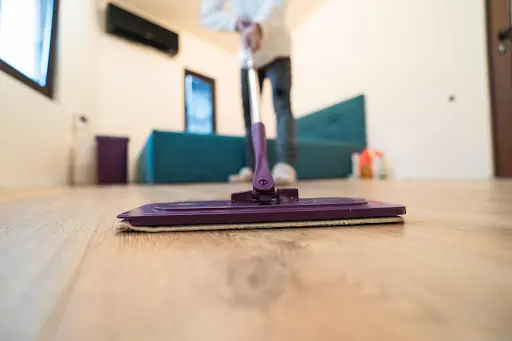When was the last time you walked into your bedroom and felt instantly calm? If clutter, dust, or unwashed sheets are part of your sleep environment, you’re not alone—but it might be affecting your quality of rest. Many studies and sleep experts agree: a clean space directly influences how well we sleep. Let’s explore why a clean bedroom matters and how to sleep better clean bedroom, starting tonight.

Why a Clean Bedroom Affects Sleep
You may be wondering, does a clean room help you sleep better? The answer is yes. Visual clutter can overstimulate your brain, making it harder to wind down. Dust and allergens in your bedding or on surfaces can disrupt breathing and trigger allergies, interfering with deep sleep. A clean space promotes a sense of order and calm, sending signals to your brain that it’s time to relax.
Related article: How to Prevent Allergies at Home: Cleaning Tips for an Allergen-Free Space
Sleep Better in a Clean Bedroom: Key Areas to Focus On
1. Declutter for Deeper Rest
A minimalist bedroom isn’t just about aesthetics—it’s about mental clarity. Remove unnecessary items, especially from nightstands, dressers, and floors. This reduces visual noise and helps your mind settle into rest mode.
2. Sleep Better with Clean Sheets
Freshly laundered sheets don’t just smell better—they feel better, too. Experts recommend washing bed linens at least once a week. Clean bedding minimizes dust mites and bacteria, helping you sleep better in a clean bedroom environment.
3. Keep Your Floors and Corners Dust-Free
Dust tends to collect under the bed, in corners, and behind furniture. Regular vacuuming or sweeping prevents allergens from building up. A cleaner floor means cleaner air—and better breathing while you sleep.
4. Organize Your Closet and Drawers
Waking up to a messy closet can impact your mood and stress levels. A tidy storage space enhances your sense of calm. Even if it’s not visible while you sleep, knowing everything is in its place contributes to better rest.
5. Air Quality and Scent Matter
A clean bedroom often includes good airflow and calming scents. Open windows during the day to ventilate the room. Use natural essential oils, like lavender or eucalyptus, to create a soothing atmosphere. Your sensory environment plays a significant role in helping you sleep better in a clean bedroom.
Related article: Creating a Serene Bedroom: How Cleanliness Enhances Calm
Does a Clean Room Help You Sleep Better? The Science Says Yes
Several studies show that people sleep longer and report better quality rest in clean environments. Whether it’s fresh sheets or less visual clutter, your physical surroundings influence your ability to relax and fall asleep. In short: yes, a clean room can help you sleep better.
Conclusion: Small Habits, Big Impact
Simple habits—like making the bed, wiping down surfaces, and reducing clutter—can create a peaceful sleep environment over time. If the task feels overwhelming, especially with a busy schedule, consider professional support. Green Frog Cleaning offers thorough, reliable cleaning services that can help you reclaim a peaceful and healthy bedroom—so you can truly sleep better in a clean bedroom.










